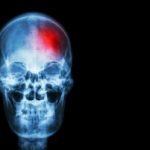 Migraine headaches with auras may double the risk of stroke as found in much research. An aura refers to feeling and symptoms experienced prior to the onset of a migraine headache – this is also called prodrome.
Migraine headaches with auras may double the risk of stroke as found in much research. An aura refers to feeling and symptoms experienced prior to the onset of a migraine headache – this is also called prodrome.
Although the exact cause of migraine headache auras are unknown, scientists believe that two common brain chemicals – serotonin and dopamine – may play a role. Some theories believe that something goes awry with serotonin and dopamine which causes the brain and the immune system to overreact. This can lead to an overflow of immune response cells to rush to the brain causing brain blood vessels to widen. The vessels then begin to open and contract thus causing the pounding sensation which you feel in your head.
Advertisement
Typical symptoms of a migraine include:
- Nausea
- Vomiting
- Yawning
- Irritability
- Low blood pressure
- Feeling hyper
- Sensitivity to light, sound and motion
- Dark circles under the eyes
When paired with aura, additional symptoms appear including:
- Blind spots
- Blindness in half or total visual field
- Seeing zigzag patterns
- Seeing flashing lights
- Feeling prickly skin
- Weakness
- Hallucinations
Migraine aura treatment involves understanding any underlying health issues which you may have that can be causing migraine headaches with aura. Once you begin working with your doctor and they can determine the cause, they will then begin working on relieving symptoms and preventing future cases of migraine headaches with aura.
Symptoms of migraine headaches with aura may be minimized by staying in a dark quiet room, taking non-steroidal inflammatory drugs (NSAIDs), placing cold compreses on your head, taking medications to relieve nausea and vomiting and taking any recommended prescription medications.
Migraine headaches with auras may increase risk of stroke
 Previous research has found that migraine headaches with auras may double a person’s risk of stroke. This risk is tripled among migraine sufferers who smoke and the risk is seven times greater in migraine sufferers who smoke and who are taking oral contraceptives.
Previous research has found that migraine headaches with auras may double a person’s risk of stroke. This risk is tripled among migraine sufferers who smoke and the risk is seven times greater in migraine sufferers who smoke and who are taking oral contraceptives.
Nearly 85 percent of strokes are ischemic meaning they are caused by a blood clot in the brain. Researchers have outlined possible explanations as to why migraine headaches with aura may increase the risk of stroke which include:
- Migraine sufferers generally have higher risk factors for cardiovascular disease
- Specific genes may play a role in both migraines and stroke
- Cortical spreading depression – a phenomenon in migraine headaches with aura – may trigger ischemic stroke
Researchers Drs. Michael Star and Jose Biller wrote, “Taking all of these possible explanations into account, the research may point to stroke and migraine sharing a reciprocal causal relationship. There is a significant amount of research attempting to further elucidate this multifaceted relationship.”
Although the precise link between stroke and migraine headaches with aura is not yet fully understand with further research, scientists and doctors can begin to better understand the relationship between the two conditions in order to find ways to better prevent both of them
Related Reading
Link between asthma and chronic migraines found
A new study suggest that asthma sufferers have nearly double the risk of experiencing chronic migraines. The research looked at over 4,500 patients who, at the beginning of the study in 2008, had less than 15 migraines a month. After a year the researchers checked to see how many people suffered from chronic migraines, which was categorized as over 15 migraines a month. Continue reading…
Advertisement
Tyramine-rich foods can trigger migraines
There are all sorts of triggers for migraines, but for many sufferers, tyramine rich foods seem to active the problem. Tyramine is a naturally occurring compound that comes from the amino acid called “tyrosine.” It acts as a releasing agent that impacts our neurotransmitters. Neurotransmitters are brain chemicals that play a major role in our bodily functions. Continue reading…
Sources:
https://www.loyolamedicine.org/news/people-who-suffer-migraine-headaches-may-be-double-risk-stroke-03252015
http://www.webmd.com/migraines-headaches/what-is-a-migraine-with-aura?page=3
